Reforms in the Healthcare System
VerifiedAdded on 2023/06/01
|7
|1685
|69
AI Summary
This argumentative essay discusses the key advantages and shortcomings of the Affordable Health Care act, followed by an opinion considering the negative implications of its ‘repeal and reform’. The essay argues that the ‘Obamacare’ was a necessary reform in the American healthcare system.
Contribute Materials
Your contribution can guide someone’s learning journey. Share your
documents today.
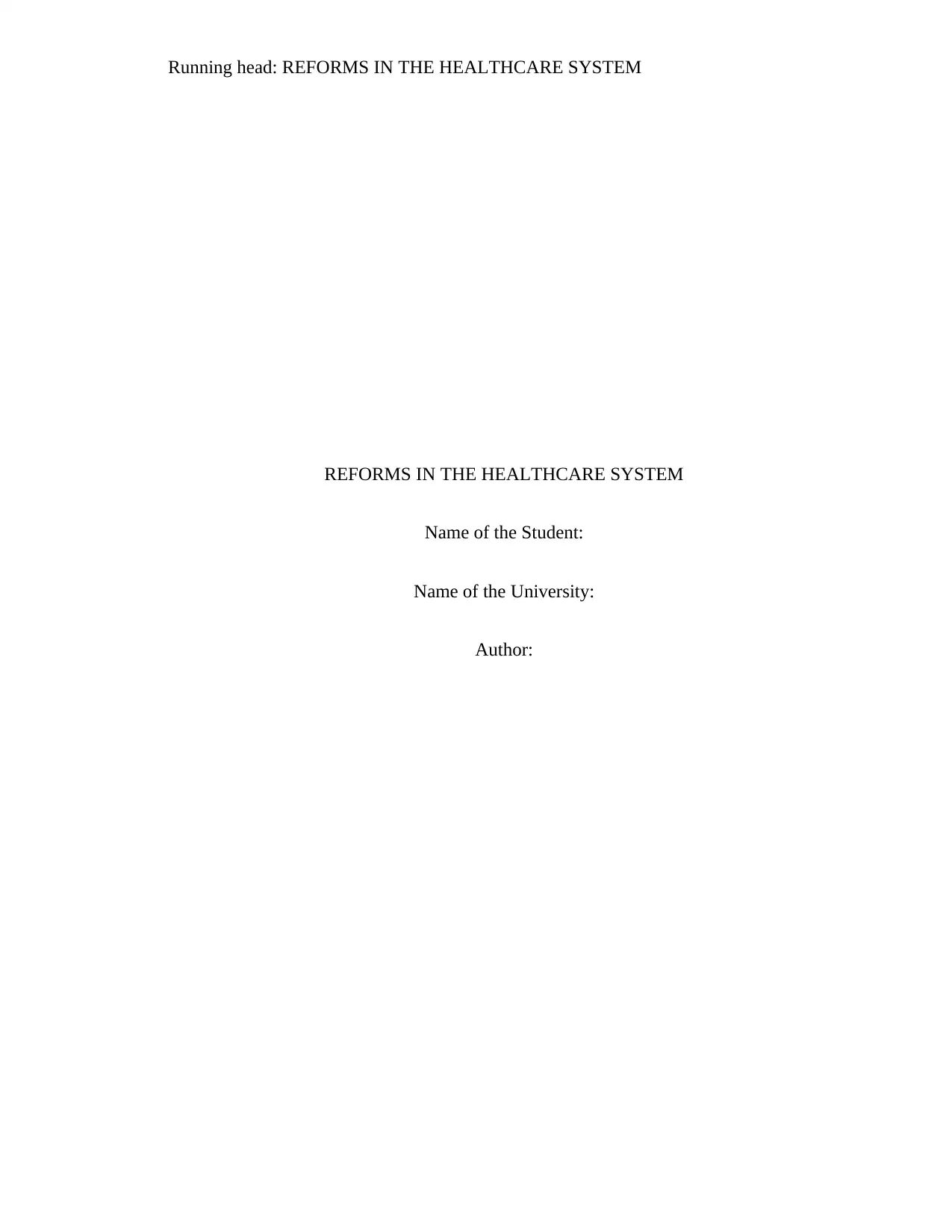
Running head: REFORMS IN THE HEALTHCARE SYSTEM
REFORMS IN THE HEALTHCARE SYSTEM
Name of the Student:
Name of the University:
Author:
REFORMS IN THE HEALTHCARE SYSTEM
Name of the Student:
Name of the University:
Author:
Secure Best Marks with AI Grader
Need help grading? Try our AI Grader for instant feedback on your assignments.
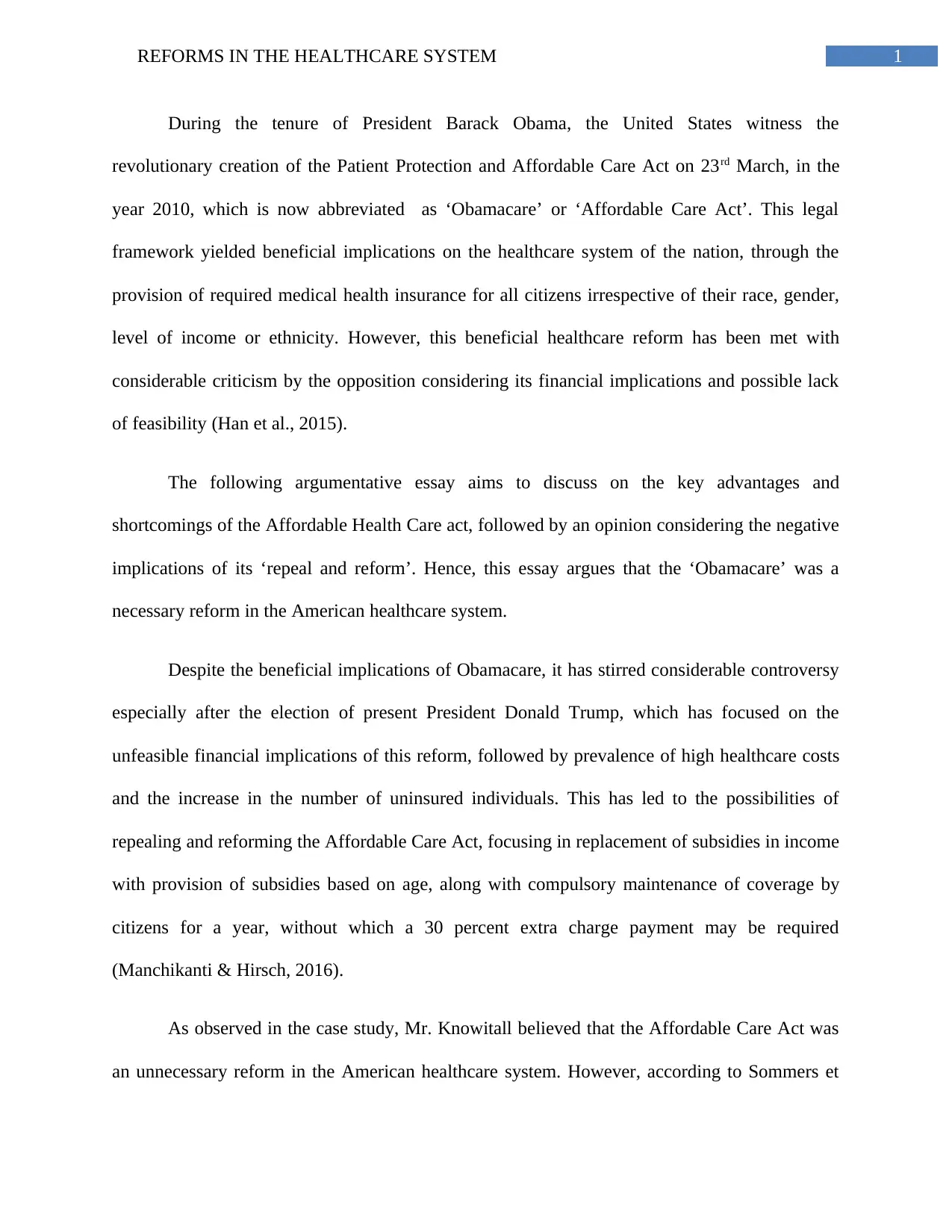
1REFORMS IN THE HEALTHCARE SYSTEM
During the tenure of President Barack Obama, the United States witness the
revolutionary creation of the Patient Protection and Affordable Care Act on 23rd March, in the
year 2010, which is now abbreviated as ‘Obamacare’ or ‘Affordable Care Act’. This legal
framework yielded beneficial implications on the healthcare system of the nation, through the
provision of required medical health insurance for all citizens irrespective of their race, gender,
level of income or ethnicity. However, this beneficial healthcare reform has been met with
considerable criticism by the opposition considering its financial implications and possible lack
of feasibility (Han et al., 2015).
The following argumentative essay aims to discuss on the key advantages and
shortcomings of the Affordable Health Care act, followed by an opinion considering the negative
implications of its ‘repeal and reform’. Hence, this essay argues that the ‘Obamacare’ was a
necessary reform in the American healthcare system.
Despite the beneficial implications of Obamacare, it has stirred considerable controversy
especially after the election of present President Donald Trump, which has focused on the
unfeasible financial implications of this reform, followed by prevalence of high healthcare costs
and the increase in the number of uninsured individuals. This has led to the possibilities of
repealing and reforming the Affordable Care Act, focusing in replacement of subsidies in income
with provision of subsidies based on age, along with compulsory maintenance of coverage by
citizens for a year, without which a 30 percent extra charge payment may be required
(Manchikanti & Hirsch, 2016).
As observed in the case study, Mr. Knowitall believed that the Affordable Care Act was
an unnecessary reform in the American healthcare system. However, according to Sommers et
During the tenure of President Barack Obama, the United States witness the
revolutionary creation of the Patient Protection and Affordable Care Act on 23rd March, in the
year 2010, which is now abbreviated as ‘Obamacare’ or ‘Affordable Care Act’. This legal
framework yielded beneficial implications on the healthcare system of the nation, through the
provision of required medical health insurance for all citizens irrespective of their race, gender,
level of income or ethnicity. However, this beneficial healthcare reform has been met with
considerable criticism by the opposition considering its financial implications and possible lack
of feasibility (Han et al., 2015).
The following argumentative essay aims to discuss on the key advantages and
shortcomings of the Affordable Health Care act, followed by an opinion considering the negative
implications of its ‘repeal and reform’. Hence, this essay argues that the ‘Obamacare’ was a
necessary reform in the American healthcare system.
Despite the beneficial implications of Obamacare, it has stirred considerable controversy
especially after the election of present President Donald Trump, which has focused on the
unfeasible financial implications of this reform, followed by prevalence of high healthcare costs
and the increase in the number of uninsured individuals. This has led to the possibilities of
repealing and reforming the Affordable Care Act, focusing in replacement of subsidies in income
with provision of subsidies based on age, along with compulsory maintenance of coverage by
citizens for a year, without which a 30 percent extra charge payment may be required
(Manchikanti & Hirsch, 2016).
As observed in the case study, Mr. Knowitall believed that the Affordable Care Act was
an unnecessary reform in the American healthcare system. However, according to Sommers et
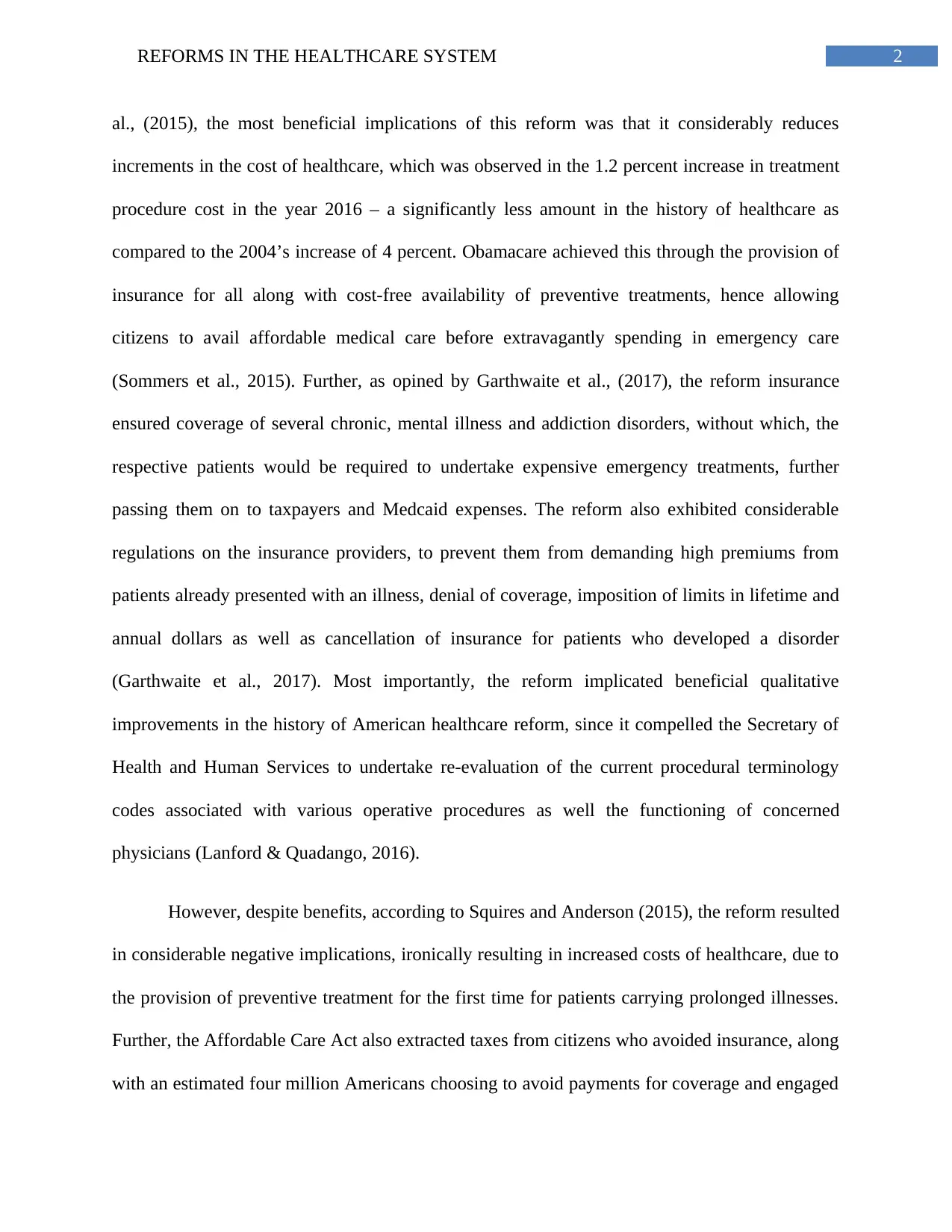
2REFORMS IN THE HEALTHCARE SYSTEM
al., (2015), the most beneficial implications of this reform was that it considerably reduces
increments in the cost of healthcare, which was observed in the 1.2 percent increase in treatment
procedure cost in the year 2016 – a significantly less amount in the history of healthcare as
compared to the 2004’s increase of 4 percent. Obamacare achieved this through the provision of
insurance for all along with cost-free availability of preventive treatments, hence allowing
citizens to avail affordable medical care before extravagantly spending in emergency care
(Sommers et al., 2015). Further, as opined by Garthwaite et al., (2017), the reform insurance
ensured coverage of several chronic, mental illness and addiction disorders, without which, the
respective patients would be required to undertake expensive emergency treatments, further
passing them on to taxpayers and Medcaid expenses. The reform also exhibited considerable
regulations on the insurance providers, to prevent them from demanding high premiums from
patients already presented with an illness, denial of coverage, imposition of limits in lifetime and
annual dollars as well as cancellation of insurance for patients who developed a disorder
(Garthwaite et al., 2017). Most importantly, the reform implicated beneficial qualitative
improvements in the history of American healthcare reform, since it compelled the Secretary of
Health and Human Services to undertake re-evaluation of the current procedural terminology
codes associated with various operative procedures as well the functioning of concerned
physicians (Lanford & Quadango, 2016).
However, despite benefits, according to Squires and Anderson (2015), the reform resulted
in considerable negative implications, ironically resulting in increased costs of healthcare, due to
the provision of preventive treatment for the first time for patients carrying prolonged illnesses.
Further, the Affordable Care Act also extracted taxes from citizens who avoided insurance, along
with an estimated four million Americans choosing to avoid payments for coverage and engaged
al., (2015), the most beneficial implications of this reform was that it considerably reduces
increments in the cost of healthcare, which was observed in the 1.2 percent increase in treatment
procedure cost in the year 2016 – a significantly less amount in the history of healthcare as
compared to the 2004’s increase of 4 percent. Obamacare achieved this through the provision of
insurance for all along with cost-free availability of preventive treatments, hence allowing
citizens to avail affordable medical care before extravagantly spending in emergency care
(Sommers et al., 2015). Further, as opined by Garthwaite et al., (2017), the reform insurance
ensured coverage of several chronic, mental illness and addiction disorders, without which, the
respective patients would be required to undertake expensive emergency treatments, further
passing them on to taxpayers and Medcaid expenses. The reform also exhibited considerable
regulations on the insurance providers, to prevent them from demanding high premiums from
patients already presented with an illness, denial of coverage, imposition of limits in lifetime and
annual dollars as well as cancellation of insurance for patients who developed a disorder
(Garthwaite et al., 2017). Most importantly, the reform implicated beneficial qualitative
improvements in the history of American healthcare reform, since it compelled the Secretary of
Health and Human Services to undertake re-evaluation of the current procedural terminology
codes associated with various operative procedures as well the functioning of concerned
physicians (Lanford & Quadango, 2016).
However, despite benefits, according to Squires and Anderson (2015), the reform resulted
in considerable negative implications, ironically resulting in increased costs of healthcare, due to
the provision of preventive treatment for the first time for patients carrying prolonged illnesses.
Further, the Affordable Care Act also extracted taxes from citizens who avoided insurance, along
with an estimated four million Americans choosing to avoid payments for coverage and engaged
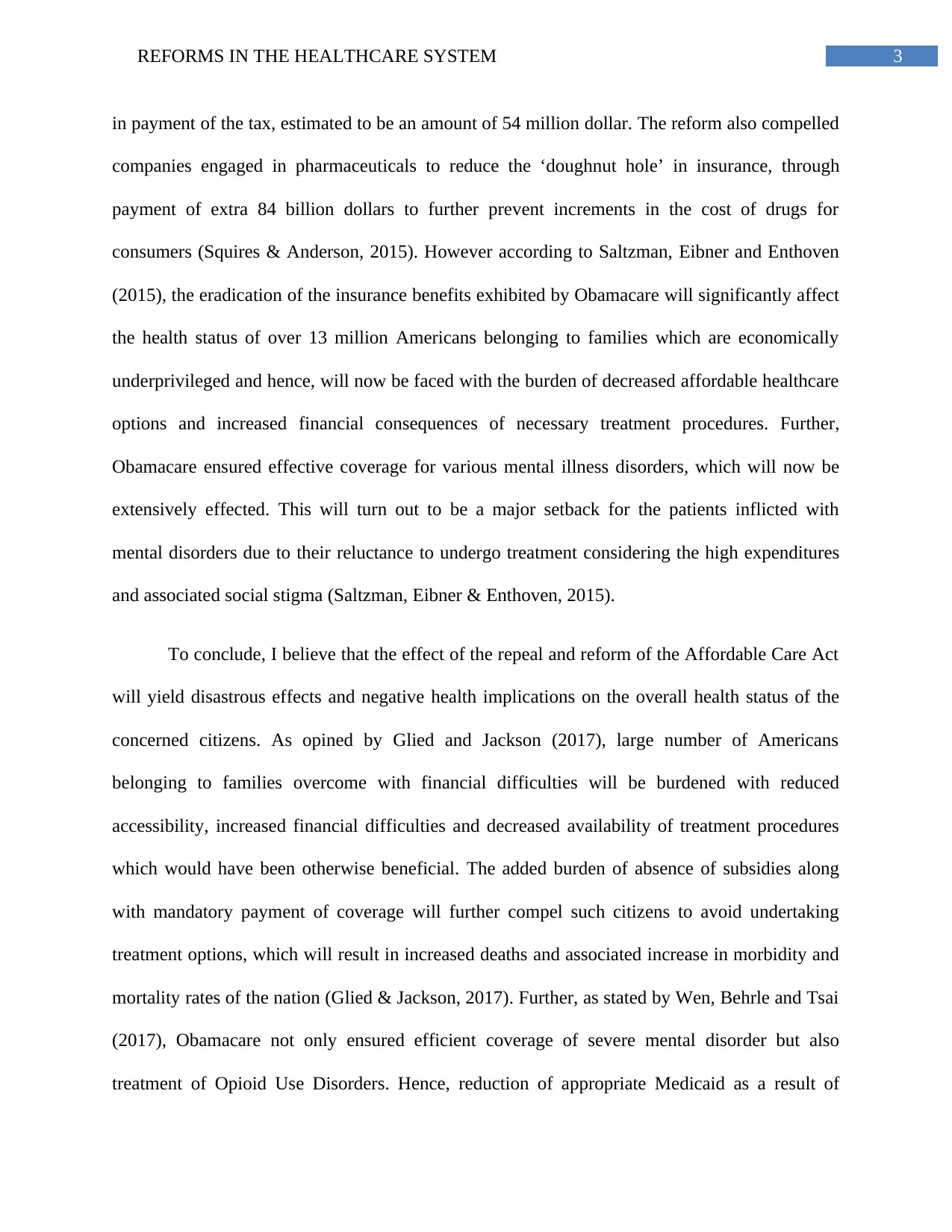
3REFORMS IN THE HEALTHCARE SYSTEM
in payment of the tax, estimated to be an amount of 54 million dollar. The reform also compelled
companies engaged in pharmaceuticals to reduce the ‘doughnut hole’ in insurance, through
payment of extra 84 billion dollars to further prevent increments in the cost of drugs for
consumers (Squires & Anderson, 2015). However according to Saltzman, Eibner and Enthoven
(2015), the eradication of the insurance benefits exhibited by Obamacare will significantly affect
the health status of over 13 million Americans belonging to families which are economically
underprivileged and hence, will now be faced with the burden of decreased affordable healthcare
options and increased financial consequences of necessary treatment procedures. Further,
Obamacare ensured effective coverage for various mental illness disorders, which will now be
extensively effected. This will turn out to be a major setback for the patients inflicted with
mental disorders due to their reluctance to undergo treatment considering the high expenditures
and associated social stigma (Saltzman, Eibner & Enthoven, 2015).
To conclude, I believe that the effect of the repeal and reform of the Affordable Care Act
will yield disastrous effects and negative health implications on the overall health status of the
concerned citizens. As opined by Glied and Jackson (2017), large number of Americans
belonging to families overcome with financial difficulties will be burdened with reduced
accessibility, increased financial difficulties and decreased availability of treatment procedures
which would have been otherwise beneficial. The added burden of absence of subsidies along
with mandatory payment of coverage will further compel such citizens to avoid undertaking
treatment options, which will result in increased deaths and associated increase in morbidity and
mortality rates of the nation (Glied & Jackson, 2017). Further, as stated by Wen, Behrle and Tsai
(2017), Obamacare not only ensured efficient coverage of severe mental disorder but also
treatment of Opioid Use Disorders. Hence, reduction of appropriate Medicaid as a result of
in payment of the tax, estimated to be an amount of 54 million dollar. The reform also compelled
companies engaged in pharmaceuticals to reduce the ‘doughnut hole’ in insurance, through
payment of extra 84 billion dollars to further prevent increments in the cost of drugs for
consumers (Squires & Anderson, 2015). However according to Saltzman, Eibner and Enthoven
(2015), the eradication of the insurance benefits exhibited by Obamacare will significantly affect
the health status of over 13 million Americans belonging to families which are economically
underprivileged and hence, will now be faced with the burden of decreased affordable healthcare
options and increased financial consequences of necessary treatment procedures. Further,
Obamacare ensured effective coverage for various mental illness disorders, which will now be
extensively effected. This will turn out to be a major setback for the patients inflicted with
mental disorders due to their reluctance to undergo treatment considering the high expenditures
and associated social stigma (Saltzman, Eibner & Enthoven, 2015).
To conclude, I believe that the effect of the repeal and reform of the Affordable Care Act
will yield disastrous effects and negative health implications on the overall health status of the
concerned citizens. As opined by Glied and Jackson (2017), large number of Americans
belonging to families overcome with financial difficulties will be burdened with reduced
accessibility, increased financial difficulties and decreased availability of treatment procedures
which would have been otherwise beneficial. The added burden of absence of subsidies along
with mandatory payment of coverage will further compel such citizens to avoid undertaking
treatment options, which will result in increased deaths and associated increase in morbidity and
mortality rates of the nation (Glied & Jackson, 2017). Further, as stated by Wen, Behrle and Tsai
(2017), Obamacare not only ensured efficient coverage of severe mental disorder but also
treatment of Opioid Use Disorders. Hence, reduction of appropriate Medicaid as a result of
Secure Best Marks with AI Grader
Need help grading? Try our AI Grader for instant feedback on your assignments.
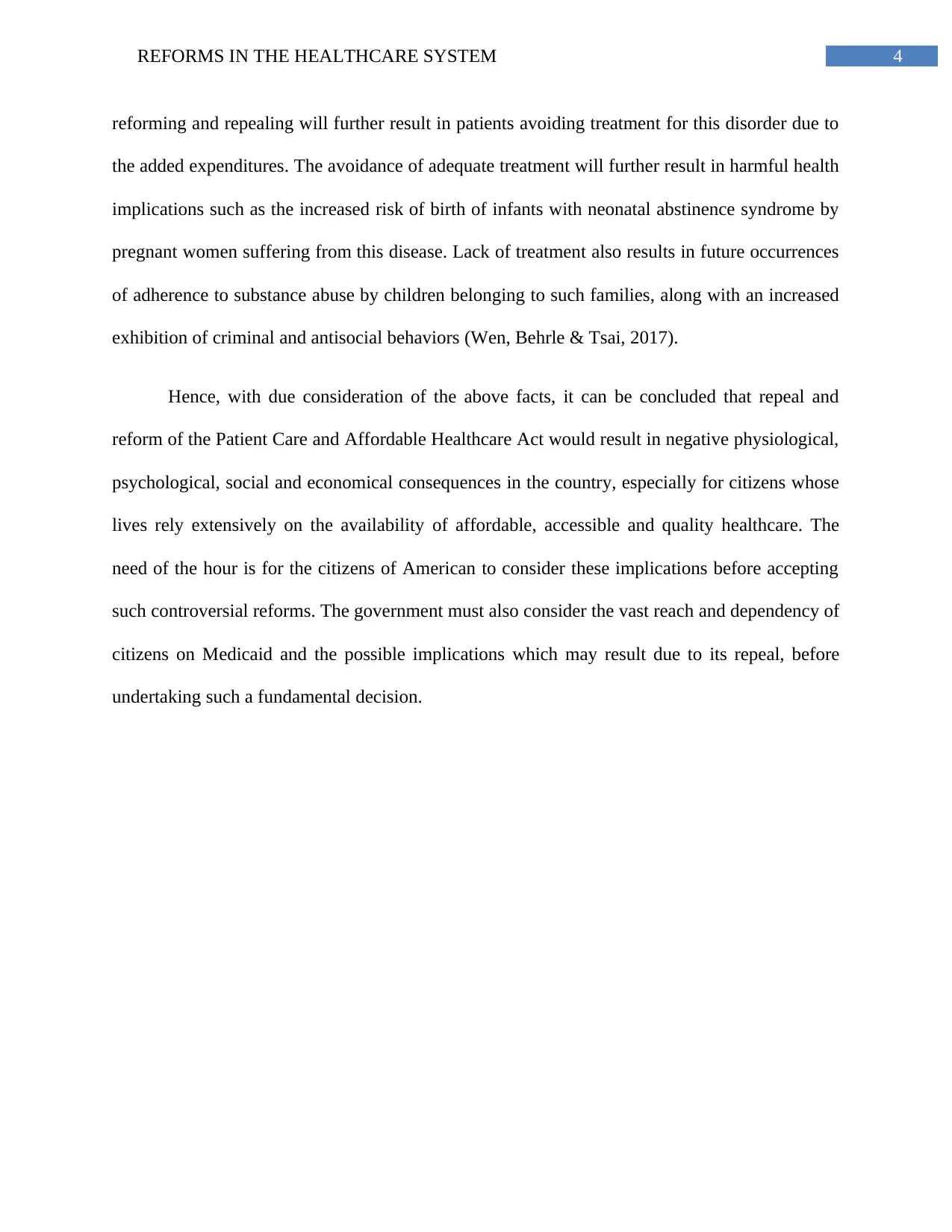
4REFORMS IN THE HEALTHCARE SYSTEM
reforming and repealing will further result in patients avoiding treatment for this disorder due to
the added expenditures. The avoidance of adequate treatment will further result in harmful health
implications such as the increased risk of birth of infants with neonatal abstinence syndrome by
pregnant women suffering from this disease. Lack of treatment also results in future occurrences
of adherence to substance abuse by children belonging to such families, along with an increased
exhibition of criminal and antisocial behaviors (Wen, Behrle & Tsai, 2017).
Hence, with due consideration of the above facts, it can be concluded that repeal and
reform of the Patient Care and Affordable Healthcare Act would result in negative physiological,
psychological, social and economical consequences in the country, especially for citizens whose
lives rely extensively on the availability of affordable, accessible and quality healthcare. The
need of the hour is for the citizens of American to consider these implications before accepting
such controversial reforms. The government must also consider the vast reach and dependency of
citizens on Medicaid and the possible implications which may result due to its repeal, before
undertaking such a fundamental decision.
reforming and repealing will further result in patients avoiding treatment for this disorder due to
the added expenditures. The avoidance of adequate treatment will further result in harmful health
implications such as the increased risk of birth of infants with neonatal abstinence syndrome by
pregnant women suffering from this disease. Lack of treatment also results in future occurrences
of adherence to substance abuse by children belonging to such families, along with an increased
exhibition of criminal and antisocial behaviors (Wen, Behrle & Tsai, 2017).
Hence, with due consideration of the above facts, it can be concluded that repeal and
reform of the Patient Care and Affordable Healthcare Act would result in negative physiological,
psychological, social and economical consequences in the country, especially for citizens whose
lives rely extensively on the availability of affordable, accessible and quality healthcare. The
need of the hour is for the citizens of American to consider these implications before accepting
such controversial reforms. The government must also consider the vast reach and dependency of
citizens on Medicaid and the possible implications which may result due to its repeal, before
undertaking such a fundamental decision.
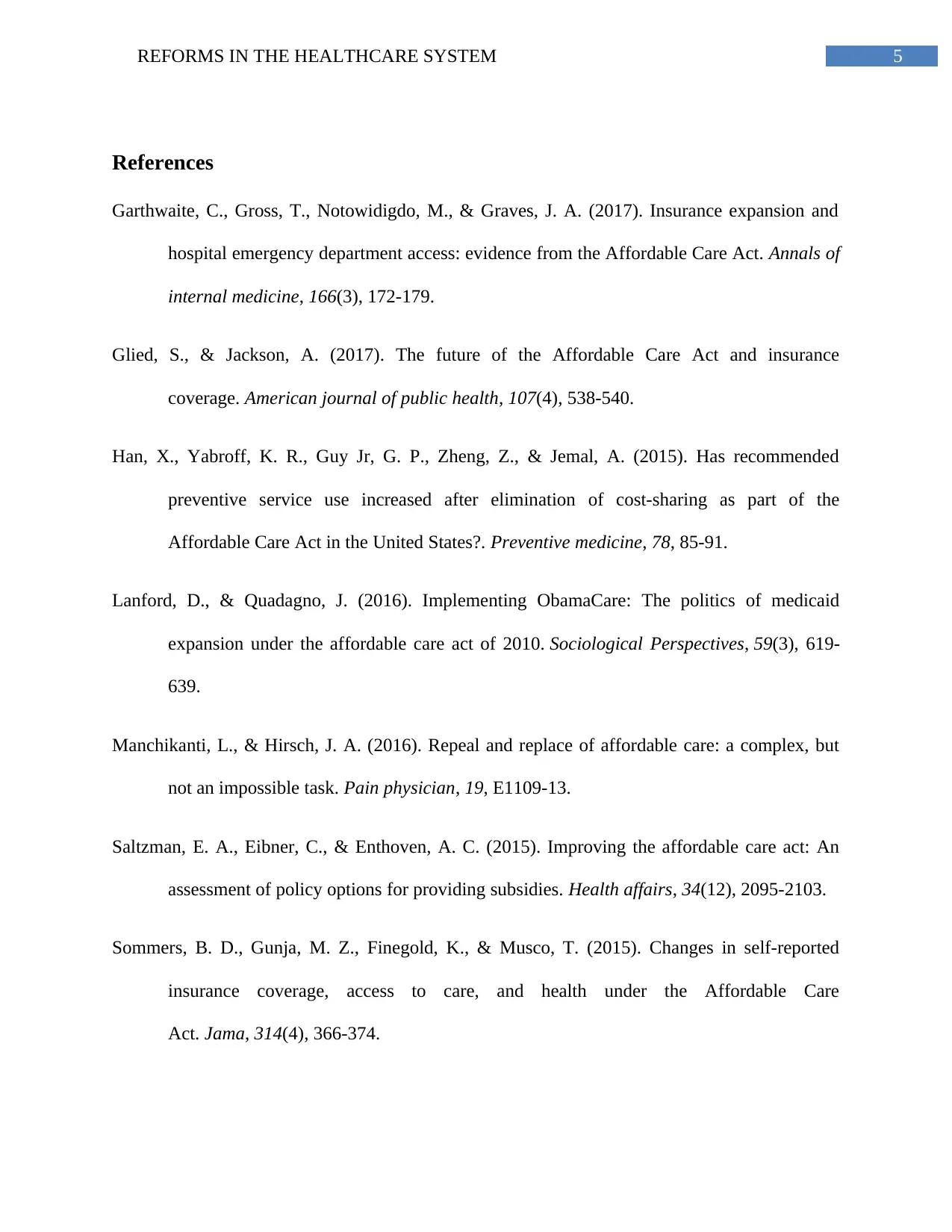
5REFORMS IN THE HEALTHCARE SYSTEM
References
Garthwaite, C., Gross, T., Notowidigdo, M., & Graves, J. A. (2017). Insurance expansion and
hospital emergency department access: evidence from the Affordable Care Act. Annals of
internal medicine, 166(3), 172-179.
Glied, S., & Jackson, A. (2017). The future of the Affordable Care Act and insurance
coverage. American journal of public health, 107(4), 538-540.
Han, X., Yabroff, K. R., Guy Jr, G. P., Zheng, Z., & Jemal, A. (2015). Has recommended
preventive service use increased after elimination of cost-sharing as part of the
Affordable Care Act in the United States?. Preventive medicine, 78, 85-91.
Lanford, D., & Quadagno, J. (2016). Implementing ObamaCare: The politics of medicaid
expansion under the affordable care act of 2010. Sociological Perspectives, 59(3), 619-
639.
Manchikanti, L., & Hirsch, J. A. (2016). Repeal and replace of affordable care: a complex, but
not an impossible task. Pain physician, 19, E1109-13.
Saltzman, E. A., Eibner, C., & Enthoven, A. C. (2015). Improving the affordable care act: An
assessment of policy options for providing subsidies. Health affairs, 34(12), 2095-2103.
Sommers, B. D., Gunja, M. Z., Finegold, K., & Musco, T. (2015). Changes in self-reported
insurance coverage, access to care, and health under the Affordable Care
Act. Jama, 314(4), 366-374.
References
Garthwaite, C., Gross, T., Notowidigdo, M., & Graves, J. A. (2017). Insurance expansion and
hospital emergency department access: evidence from the Affordable Care Act. Annals of
internal medicine, 166(3), 172-179.
Glied, S., & Jackson, A. (2017). The future of the Affordable Care Act and insurance
coverage. American journal of public health, 107(4), 538-540.
Han, X., Yabroff, K. R., Guy Jr, G. P., Zheng, Z., & Jemal, A. (2015). Has recommended
preventive service use increased after elimination of cost-sharing as part of the
Affordable Care Act in the United States?. Preventive medicine, 78, 85-91.
Lanford, D., & Quadagno, J. (2016). Implementing ObamaCare: The politics of medicaid
expansion under the affordable care act of 2010. Sociological Perspectives, 59(3), 619-
639.
Manchikanti, L., & Hirsch, J. A. (2016). Repeal and replace of affordable care: a complex, but
not an impossible task. Pain physician, 19, E1109-13.
Saltzman, E. A., Eibner, C., & Enthoven, A. C. (2015). Improving the affordable care act: An
assessment of policy options for providing subsidies. Health affairs, 34(12), 2095-2103.
Sommers, B. D., Gunja, M. Z., Finegold, K., & Musco, T. (2015). Changes in self-reported
insurance coverage, access to care, and health under the Affordable Care
Act. Jama, 314(4), 366-374.
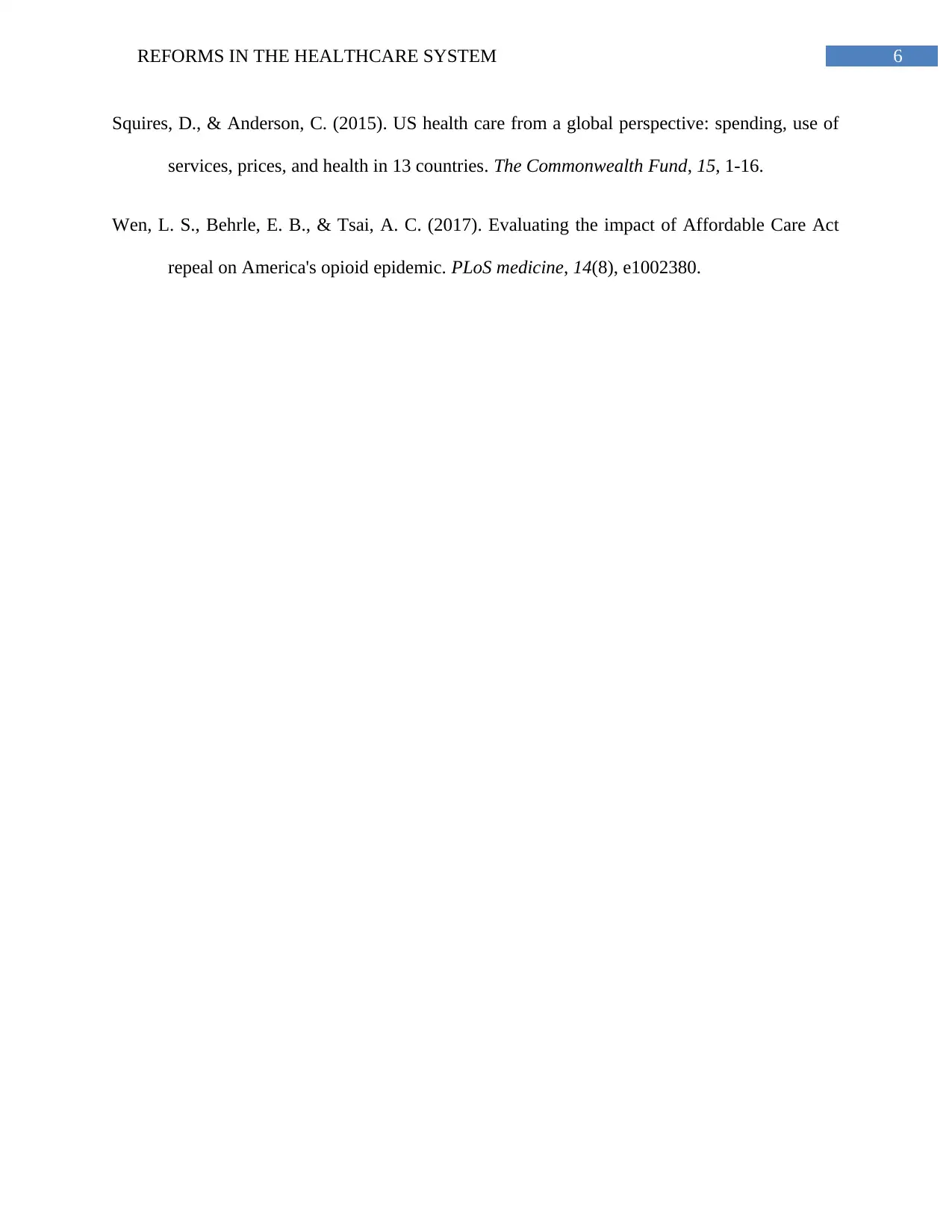
6REFORMS IN THE HEALTHCARE SYSTEM
Squires, D., & Anderson, C. (2015). US health care from a global perspective: spending, use of
services, prices, and health in 13 countries. The Commonwealth Fund, 15, 1-16.
Wen, L. S., Behrle, E. B., & Tsai, A. C. (2017). Evaluating the impact of Affordable Care Act
repeal on America's opioid epidemic. PLoS medicine, 14(8), e1002380.
Squires, D., & Anderson, C. (2015). US health care from a global perspective: spending, use of
services, prices, and health in 13 countries. The Commonwealth Fund, 15, 1-16.
Wen, L. S., Behrle, E. B., & Tsai, A. C. (2017). Evaluating the impact of Affordable Care Act
repeal on America's opioid epidemic. PLoS medicine, 14(8), e1002380.
1 out of 7
Related Documents
Your All-in-One AI-Powered Toolkit for Academic Success.
+13062052269
info@desklib.com
Available 24*7 on WhatsApp / Email
![[object Object]](/_next/static/media/star-bottom.7253800d.svg)
Unlock your academic potential
© 2024 | Zucol Services PVT LTD | All rights reserved.





